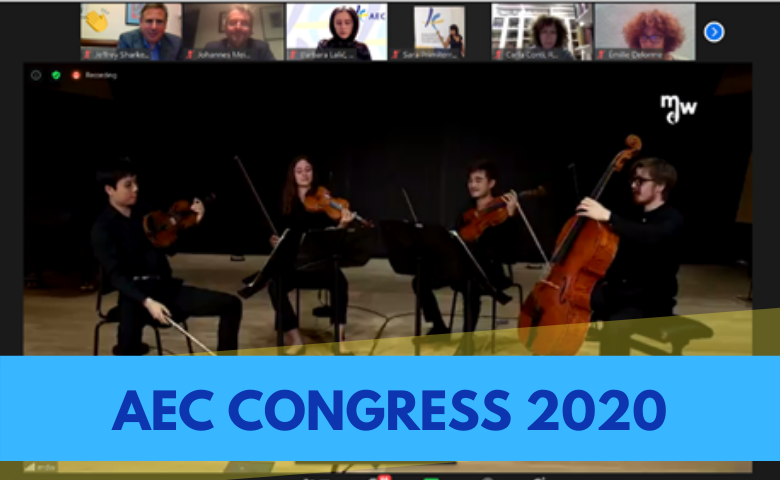The 47th AEC Annual Congress and General Assembly 2020 took place online on 5-7 November under the title “Connecting Communities in the Digital Age”. This year, due to the pandemic, the Congress and General Assembly were held for the first time in the AEC history completely online in accordance with the spirit of its title. The University of Music and Performing Arts (mdw) in Vienna has shown high professionalism in managing the broadcast of live performances, including the première of a 3-points long distance performance that took place with musicians located in Vienna, Trieste and Tallinn via the LoLa system. Thus, indeed the online Congress has become the symbol of a new digital epoch in which musicians, professors and students from all over the world can connect with each other and discuss a variety of topics in the music field.
This year’s title refers to an essential question, which has become more than ever a hot topic due to the Covid-19 crisis and the growing speed of the digitisation process making hybrid communication not only important but unavoidable.
The AEC Congress 2020 offered several workshops, discussion forums, best practice presentations and plenaries. The Congress took place in the framework of the activities of the Creative Europe co-funded project AEC – Strengthening Music in Society (SMS), and was co-hosted also by the Conservatorio di Musica di Milano, Italy and the Estonian Academy of Music and Theatre in Tallinn. We had the honour to have as a speaker Themis Christophidou, Director General for the EU Commission's policies on Education, Youth, Sport and Culture.

A wide range of proposed parallel sessions related to the topics of digitisation, music education and crisis management were proposed:
1. Discussion and sharing practices in house to house technologies for distant musical interaction.
2. Audiences in the post Covid world: a view from the profession
3. Responding to change
4. Diversifying classical music education: the role of conservatoires
5. The Umbrella Perspective in Jazz, Pop, Folk and more – How to include cross genres activities for collaboration?
6. Questionable oxymorons: what is easier, to rehears with a fish choir or to teach a chamber music ensemble online?
7. Student Centred Learning in the digital age
8. CoOPERAte – how to connect, create and collaborate in opera education beyond lockdown
9. Digital DIY: The creative and universal musician in the hybrid age
10. Exploring Prejudices and Bias in the Conservatoire: Student Experiences Outcomes and Actions
11. Higher Music Education Goes Green
12. ECMA Pro Creative Europe project on chamber music
13. How to deal with a situation you are not prepared for as an institution: experiences from the COVID crisis
14. Entrepreneurship Projects: News in Map, SMS working group 3, IMZ academy and DEMUSIS
15. Discussion on the meaningful integration of digital technology in music education
16. Is the virtual real? Re-imagining future opportunity for music in a more power-balanced and interconnecting global society a session
17. Sounds of Solidarity: Music and Migration in Higher Music Education
18. Health and well-being of staff and students
Participants also had the opportunity to watch in advance some videos and take part in Q&A sessions during lunch time on the following topics: The Manifesto 2020 of the International Relations Coordinators, The evaluation of LoLa in the SWING Project by the Learning and Teaching working group, MiMIc – Meaningful Music in Healthcare, ECME – Early Childhood Music Education Working Group, and What we can learn from the gaming industry. The same format was used for the Information Gallery on Saturday morning, which featured pre-recorded videos and Q&A on initiatives proposed by participants.
In addition, participants had a chance to discuss relevant issues in Regional Meetings on Saturday morning, chaired by AEC Council Members.
The AEC Congress was preceded by six Pre-Congress Workshops organised by MusiQuE, by the AEC – Strengthening Music in Society Project (SMS) project working groups n. 1 (Music and Society), 2 (Diversity and Inclusiveness) and 7 (Students’voice), and by the projects SWING and European Opera Academy. An additional workshop on Entrepreneurship and COVID-19 (by the SMS working group 3 of the SMS project) has been moved to 27th November.
The ever-increasing number of participants contributed to make this edition stronger than ever, with an overall participation that reached the record number of 413 attendees. Students took an active participation in the event and joined discussions on the most significant issues of the future of higher music education.
The AEC General Assembly 2020, which took place on Saturday 7th November, featured the election of Elisabeth Gutjahr (Mozarteum University, Salzburg, Austria) as the new Vice President and Rico Gubler (University of Music Lübeck, Germany) as new Council Member. During the General Assembly the AEC Strategic Plan has been extended for 2 more years and members have been invited to send their comments on the AEC Action Plan. A summary of the General Assembly has been provided to AEC members through a mailing.
The various Congress sessions have been refreshed by outstanding music performances broadcasted live from mdw in Vienna bringing inspiration and enjoyment for participants from all over the world, who attended it both from the comfort of their homes and offices.
All the documents and slides of the AEC Annual Congress 2020 and videos of pre-Congress workshops, Newcomers’ and Students’s Welcome Sessions, Opening Session and Plenary Sessions I are available at the event page on the AEC website under the tab “Photos and documents”. Registered participants will receive in the coming weeks a full report including all recordings of the sessions.






